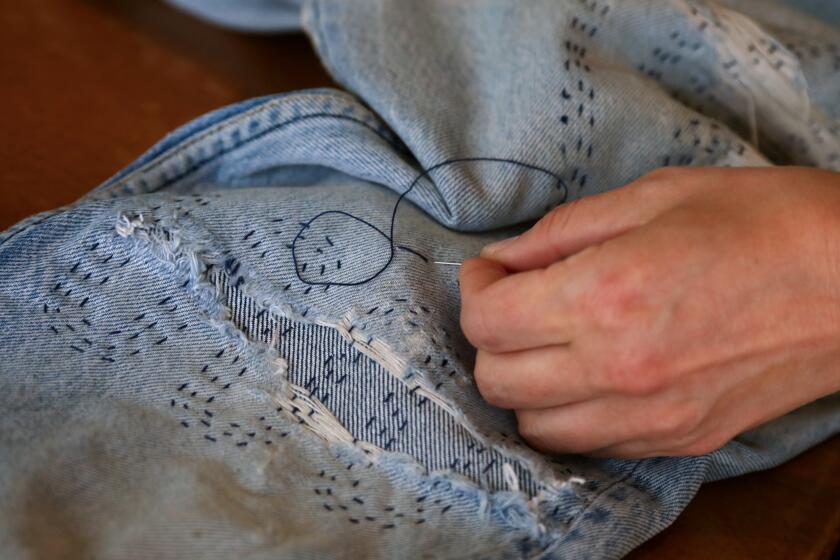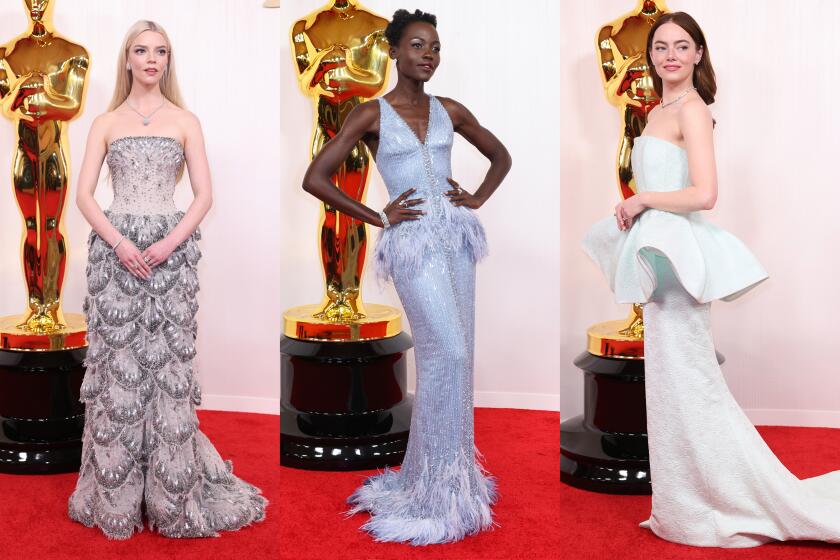It’s cool to be country
The Coen brothers’ “True Grit,” which plays out over rural Arkansas and the Indian Territory of the 1870s, is the duo’s highest-grossing film to date, and last week it became the second-most-nominated movie in this year’s Oscar race.
Earlier in January, Oscar winner Gwyneth Paltrow made her return to the multiplex via Nashville in “Country Strong”; in December, a jumpsuit worn by the late Johnny Cash sold for 10 times the expected amount at auction; and the Ralph Lauren women’s spring/summer collection that’s soon to hit stores has a distinct frontier glam flavor (think a rodeo’s worth of leather and fringe, oversized steer-head belt buckles and lacy blouses with leg-of-mutton sleeves).
It’s as clear as a dust cloud on the horizon coalescing into a stampede of bison: Call it country, Western, country-and-Western or something else altogether, but popular culture can’t seem to get enough of rural Americana.
Even the recent fall/winter menswear runway shows in Milan and Paris found luxury brand collections taking inspiration from both the modern-day Amish (at Louis Vuitton) and the early settlers of the American West (at Dsquared2). Moonshine has become as trendy as absinthe. Canning and raising chickens have become hipster hobbies. And one of the most popular time-wasters on Facebook — played by nearly 55 million people this month alone — is a faux-farmstead game that has people harvesting virtual crops and tending to virtual livestock.
“It’s cool to be rural now,” says Patrick Gottsch, founder and chief executive of the Omaha-based Rural Media Group, which owns RFD-TV, a cable network devoted to rural issues. “For a while, there was a stigma [about the country] — that you had to move to the city to make a living. And that’s been changing.”
Gottsch, who launched RFD-TV a decade ago to cater to the appetite for all things country — the programming focuses heavily on equine, agribusiness and country music topics — might be expected to have that opinion, but the numbers released by Nielsen Media Research this month lend credence to the characterization — RFD-TV’s weekly average viewership of 13,215,000 represents an increase of 74% since 2007.
The folks at Viacom-owned, Nashville-based CMT (which stands for Country Music Television) have similarly noticed an increased awareness of — and appreciation for — country. In June, the premiere of its annual Music Awards telecast pulled in 3 million viewers — up 19% from 2009, and the channel is in about 91 million U.S. households. “I like to say we’re in 90 million homes — and they aren’t all trailer parks,” said Dee McLaughlin, CMT’s senior vice president of brand marketing.
Since part of McLaughlin’s job is to debunk what she calls the “haystacks and critters” stereotype about country, she’s watched the shift happen from a front-row seat. “It’s definitely something I’ve noticed over the last two years, especially with people like Carrie Underwood and Taylor Swift on the covers of magazines, and Keith Urban being married to Nicole Kidman. … And I was just out in Los Angeles, and all these restaurants were serving deviled eggs — and deviled eggs are a real country-style comfort food.” (McLaughlin’s trip to L.A. had to do with CMT’s newest venture — the channel’s first scripted sitcom, “Working Class,” which was set to premiere Friday.)
But the growing appetite for country hasn’t just been about entertainment options coming out of Nashville or Nebraska. In December, at an auction of Johnny Cash memorabilia at Julien’s Auctions in Beverly Hills, the blue jumpsuit he wore in rehearsals for a 1969 concert at San Quentin State Prison was expected to fetch between $3,000 and $5,000. It ended up selling for $50,000.
“Part of me was surprised and part of me wasn’t,” said the auction house’s president and chief executive, Darren Julien, adding that value for an artist such as Cash — and for country- or Western-themed memorabilia in general — lies overseas. “It was actually a collector in Belgium who ended up buying the jumpsuit. The collectors who are spending the big money on Western pop culture are from outside of the U.S.”
Julien describes this genre of memorabilia as a “developing market.” He said the auction house is working on some auctions with what he describes as “significant country artists,” but he wouldn’t divulge any names, citing confidentiality. “But I can say it’s something we want to explore — China is huge into Western pop culture,” he said.
The thread runs through cyberspace, where a Facebook application called FarmVille, launched by game maker Zynga in mid-2009, has attracted millions of players, resulting in the creation of 30 million virtual farms (compared with just north of 2 million actual farms in the U.S., according to a 2007 study by the U.S. Department of Agriculture) and becoming the most popular Facebook game of 2010.
Backwoods America has even been distilled to its essence and bottled — in the form of moonshine (essentially unaged whiskey and variously known as hillbilly hooch or white lightning) that is being stocked in trendy watering holes in Los Angeles and New York. One brand, Stillhouse Distillery’s Original Moonshine Clear Corn Whiskey, made its high-profile debut at a bash thrown by menswear designer John Varvatos during New York Fashion Week in September.
“We’d only been around for 12 weeks, and we were something like the 19th most-mentioned or searched-for spirit on social media, and we had 3,000 Twitter followers,” said Brad Beckerman, chief executive and co-founder of the Stillhouse brand. And while he echoes Julien’s point that rural America — be it in the form of country music, western movies or moonshine — has export value beyond our borders, he also sees the interest in rural themes as an antidote to modern life — the pop cultural equivalent of the slow food movement.
“It’s the speed of everything,” Beckerman said. “Thanks to things like the BlackBerry and the Internet, people are exhausted at how fast everything moves. People want to come back to center. They want to go to a moment in time when everything moved at a slower pace, back to their roots.”
While both CMT’s McLaughlin and RFD-TV’s Gottsch also cited a desire to return to one’s roots, McLaughlin pointed to the economic downturn of the last two years as the motivating factor, and Gottsch went further back.
“The resurgence has really been going on for the past 10 years,” Gottsch said. “After 9/11 was when people really wanted to reconnect with their roots, and I think most baby boomers either grew up on a farm or had a grandma or grandpa who had a farm before they moved to the city, so it’s this yearning for things to go back to the way they used to be.”
But trends don’t last forever, and even before Jeff Bridges (who, by the way, took home an Academy Award last year for his role as a country singer in “Crazy Heart”) rode into theaters as “True Grit’s” one-eyed U.S. marshal, Rooster Cogburn, a game that rolled out in November had already pushed FarmVille down to the No. 2 spot.
It’s called CityVille.




